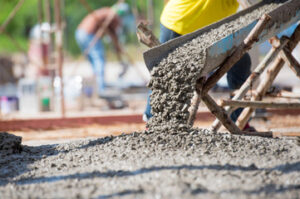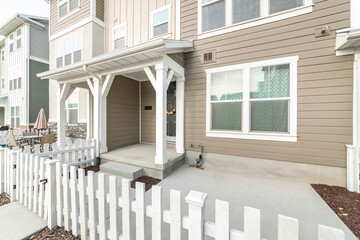Commercial Concrete is used for a wide range of applications in commercial building construction and architectural enhancement. Commercial Concrete Contractors Dallas TX use a highly durable material that lasts up to 50 years if properly maintained.
Choosing the right concrete contractor is crucial for ensuring your project is completed on time and within budget. Look for contractors who can provide references and reviews from past clients.

Commercial concrete is a construction material used in buildings and other structures to provide support, structure, and protection. It is also a very durable material that requires minimal maintenance. It is available in various colors and textures and can be molded into many different shapes. In addition, it can be mixed with a variety of additives to improve its strength and durability. Commercial concrete is also available in precast or prestressed forms, which can help reduce installation costs and speed up project completion.
There are several types of commercial concrete, including glass concrete, asphalt concrete, and cement. Each has its own unique characteristics, but all can be used for commercial purposes. For instance, glass concrete can be colored to give a polished or decorative look to slabs and exterior cladding. Asphalt concrete, on the other hand, is often used as a base for roads, driveways, airport runways, and parking lots.
The cost of commercial concrete will vary depending on the type and amount of materials used. It is important to compare the prices of different contractors before making a decision. This will ensure that you get the best price for your concrete project. Additionally, you should look for a contractor who has experience working on similar projects and is licensed, insured, and bonded.
A good commercial concrete contractor should be able to handle a variety of tasks, including pouring foundations and floors, constructing walls, and providing structural support. They should also have a strong understanding of building codes and regulations, as well as the ability to work with various equipment.
While concrete is a natural product made from stone, sand, and water, it uses a significant amount of raw materials, energy, and heat during production. It is also non-biodegradable and produces CO2 when it decomposes. To minimize the environmental impact of concrete, consider choosing a green alternative such as bio-flooring. This is a sustainable flooring solution that reduces carbon footprint, uses renewable resources, and includes recycled content. It is a great alternative to traditional concrete and is a popular choice for commercial spaces.
Concrete is a resilient material that lasts for decades when it’s properly maintained. However, like all materials, it deteriorates over time and may require repair or even demolition. There are a number of factors that can affect the durability of concrete, including its strength, how it’s installed, and how much use it gets. Abrasion, erosion, cracking, and chemical attacks can all damage concrete over time, but proper maintenance can help prolong its lifespan.
Concrete construction has evolved over the centuries, but it’s still made primarily from cement, aggregates, and water. Modern commercial concrete contractors are highly skilled and use a precise mixture of ingredients to create high-quality concrete that meets the needs of their customers. This is especially important for projects in harsh climates where the concrete will be exposed to extreme temperatures and other environmental conditions.
The main purpose of concrete is to act as a load bearing component, so its structural durability is vital. Concrete has great compressive strength, which allows it to withstand heavy loads. However, concrete is quite weak in terms of tensile strength and can crack under stress. It also lacks a certain degree of ductility, which is why concrete must be designed with safety in mind.
Commercial concrete can be reinforced with fibrous additives that increase its strength and durability. The most commonly used fibers are steel, glass, polypropylene-polyethylene, and carbon, with lengths ranging from several centimeters to a fraction of a millimeter (microfibers). Vegetable fibers such as cellulose from wood, wheat, rice husks, and bagasse are becoming increasingly popular due to their sustainability.
Besides strengthening the concrete, these additives reduce permeability and make it more resistant to freezing and thawing cycles, deicing chemicals, and soil contaminants. They can also enhance the durability of concrete by reducing its susceptibility to thermal cycling, which is an extremely critical factor in many areas. These improvements make concrete a more durable and long-lasting building material, especially for use in highways, runways, and other infrastructure projects. This will minimize the need for costly, complex repairs and improve the reliability of existing infrastructure.
Commercial concrete is a construction material that is used in several industrial and commercial projects. It is made of aggregate, cement, small stones, sand, and water that is mixed together to create a strong and durable material. This concrete is then poured in a form and allowed to harden through a chemical process called hydration. This process gives concrete its strength and durability, and it is often molded into innovative designs to create structures such as bridges, buildings, and parking lots.
One of the main characteristics of commercial concrete is its ability to withstand heavy traffic and weathering. It is also highly flexible, which makes it ideal for construction work that requires large amounts of movement. The flexibility of commercial concrete also makes it possible to incorporate unique design features into buildings, such as staircases and specialized columns.
In addition to its high level of durability, commercial concrete is also designed to meet stringent safety and environmental standards. It is made with special elements to ensure that the structure can withstand fire and environmental stress, and it is usually formulated to allow stormwater drainage in accordance with local regulations.
When it comes to appearance, commercial concrete can be made in a variety of colors and patterns to match the aesthetics of a particular building or business. In addition, it is available in different finishes, such as textured and exposed aggregate. Some types of commercial concrete are even able to recycle industrial waste products, such as fly ash, waste glass, and slag, to replace some of the cement and aggregates in the mix.
Commercial concrete is commonly used to make roads, airport runways, sidewalks, and parking lots. It can also be used in concrete blocks, tunnels, columns, beams, and staircase units. One of the advantages of using this material is that it can be prepared and transported quickly on site, which saves time and money. Another benefit is that it is less prone to cracking than other materials, such as wood or asphalt.
Commercial concrete is also a popular choice for flooring because it is easy to clean and maintain. It is resistant to stains, scratches, and spills, and can be sealed with various coatings to protect it from damage. Moreover, it is highly durable and will last for many years without needing any maintenance.
Concrete is one of the most versatile building materials. It can be colored, stamped, and molded to create different shapes and designs, making it ideal for commercial construction projects. It also offers a wide range of structural benefits, including durability, longevity, and affordability. In addition, it is a fire-resistant material and has the ability to resist water damage. Concrete is also a good choice for plumbing projects, such as pipes and drains, because it does not rust. This means that it will not need to be replaced or repaired as often as metals, which can deteriorate quickly.
In addition to its strength and versatility, commercial concrete is relatively inexpensive to install. In fact, it is cheaper to build a structure with concrete than to build it with steel or wood. In addition, concrete requires less maintenance than other construction materials, such as masonry and wood, which require regular painting and coating to protect them from the elements. Additionally, concrete does not rot or attract termites like wood and masonry do.
Regardless of the type of concrete used, commercial contractors must ensure that their work meets industry standards. They must maintain strict safety standards and adhere to all zoning requirements. They must also be able to meet deadlines and budgets. In order to do so, they must use a variety of specialized equipment, including mixers and pumps.
Commercial concrete contractors specialize in working on commercial construction projects, and they are able to provide a range of services from foundations to walls. They may also be responsible for repairing and restoring existing concrete structures. They have the knowledge and expertise to complete all aspects of a construction project, from design to planning to execution.


